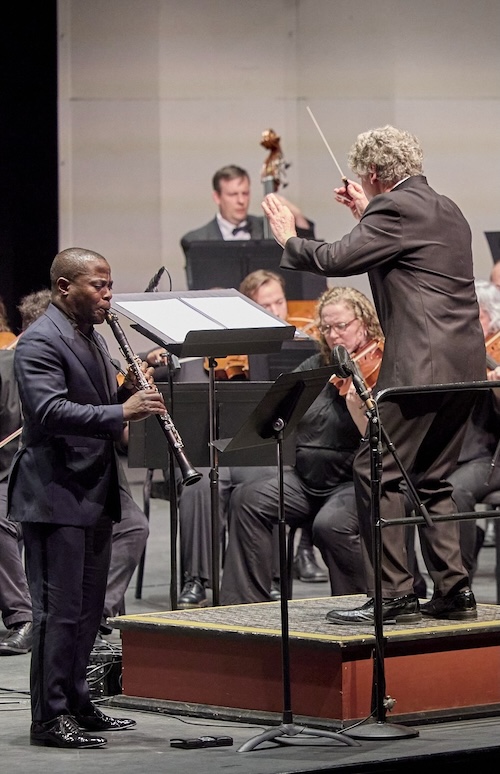Clarinetist McGill brings brilliant advocacy to concerto premiere with Fairfax Symphony

Anthony McGill performed the concert premiere of Malek Jandali’s Clarinet Concerto with Christopher Zimmerman conducting the Fairfax Symphony Orchestra Saturday night. Photo: Daniel Corey
Malek Jandali completed his Concerto for Clarinet in 2021, and its dedicatee, Anthony McGill, recorded it in 2022.
It took until Saturday night for its first public performance, however. McGill, principal clarinet for the New York Philharmonic and one of the foremost exponents of his instrument, joined the Fairfax Symphony Orchestra and music director Christopher Zimmerman to publicly premiere the concerto at the Center for the Arts at George Mason University.
Jandali was born in Germany, raised in Syria, and now resides in New York and Atlanta. He originally came to the United States to study piano performance, but, as he said in a pre-concert discussion, “Witnessing the destruction of my homeland made me think more about music…There is nothing better than the symphony orchestra to tell the story of the beauty of my culture.” The concerto is dedicated to McGill “in memory of all victims of injustice.”
In the tradition of composers like Antonin Dvorák and Béla Bartók, Jandali fits themes from his culture into traditional classical forms. The clarinet concerto has the traditional three movements (fast-slow-fast), with harmonies influenced by Syrian modes, but nothing that would be forbidding to any but the least adventurous listeners.
The concerto opens with pizzicato strings and murmurs in the winds and percussion creating an expectant mood. When McGill entered, his playing was magnetic—effortlessly precise flutter-tonguing, flawless tone and dynamics, and a keen sense of rhythm all helped to bring Jandali’s Syrian themes to symphonic life. Under Zimmerman, the orchestra matched his concentration, playing with great energy while also maintaining balances to ensure that McGill’s clarinet stood out in the sound. The second theme in the first movement sticks in the memory—softer than the music that came before, yet still devilishly difficult; peaceful, yet pleading.
The Nocturne second movement was less a lullaby than an eerie nightfall, with McGill assaying a yearning, winding theme and its variations as the orchestra quietly bumped, shuddered, and creaked, spotlighting the melody and destabilizing the mood. That disquiet was succeeded by a blistering finale, filled with appealing themes and inventive orchestration. The virtuoso demands on McGill increased as the tempo accelerated, until the movement climaxed in a captivating cadenza that showed McGill’s mastery of virtually every clarinet technique, followed by a mad dash to a rousing close.
After the performance, Jandali came onstage for bow with McGill and the orchestra, and soloist and composer both received bouquets; flush with enthusiasm from the performance, Jandali ran around giving flowers from his bouquet to individual members of the orchestra until the press of time demanded that everyone exit the stage.
Instead of a traditional overture, Zimmerman programmed three selections from Jandali’s Symphony No. 6, a symphonic suite titled “The Desert Rose,” to open the program. Both the first and second pieces offered a strong drive from conga rhythms that persisted throughout. The first illustrated the awakening to prayer at the start of the day through a long, slow crescendo that Zimmerman and the orchestra built expertly, while the second convincingly evoked a furious dance of swords. The last piece, depicting a party using a children’s song, scurried about merrily, with nimble work from the FSO strings. (The symphony has also been recorded.)
One missed in Jandali’s music a firm sense of development. The composer tends to present a theme, elaborate on it a bit, and then move on, relying on melodic appeal and atmosphere to sustain interest.
Beethoven’s Symphony No. 3, which the FSO played after intermission, provided the greatest possible contrast, working its themes over at a length that often exasperated Beethoven’s contemporaries.
The first movement of the Beethoven featured a few tempo mix-ups among sections and little crispness apart from Jonathan Milke’s crackling timpani rolls; one wondered whether the orchestra had expended all its energy on Jandali’s music.
Yet once the Marcia funebre began, the orchestra seemed to get a second wind, delivering a compelling performance; the fugato in particular had the power and drive of a giant drill, with Zimmerman carefully ratcheting up the tension with each entrance of the subject.
The Scherzo had a few messy parts but bursted with energy, and the finale was as grand and incisive as anyone could want, with FSO principal oboe Emily Foster exceptionally eloquent in her solos. From a listener’s perspective, this was perhaps too long a symphony to close a demanding program for a regional ensemble, but it ended on a high note.
The Fairfax Symphony Orchestra will perform Anna Clyne’s Dance for cello and orchestra with soloist Inbal Segev, plus works by Prokofiev and Stravinsky, on May 18. fairfaxsymphony.org
